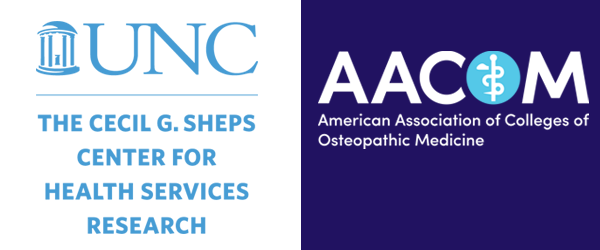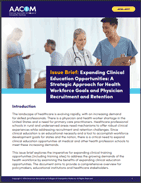AACOM UME-GME Task Force Working Group
GME Development Clearinghouse
The Task Force and AOGME have collaborated to develop resources supporting Colleges of Osteopathic Medicine in Graduate Medical Education development. These resources offer guidance, tools, and best practices covering various areas such as GME Finance, State-based Initiatives, GME Development Institute, and Rural GME. COMs can utilize these resources for training, reference, customization to their needs, and collaboration with other institutions, ultimately enhancing the quality and effectiveness of their GME programs.
Live events
Outcomes Data from Community-based and Rural Underserved Residency Programs
May 7, 2025
State-level Collaboration for GME Development
June 4, 2025
On-demand Recordings
Community Engagement Program Development and Sustainability for Rural Programs
Held Feb. 5, 2025
Rural and Community-based Surgery Residency Programs: An Overview of the Current Landscape and How to Leverage Opportunities
Held Oct. 30, 2024
Graduate Medical Education Development Strategies in Underserved and Community-Based Settings
April 8, 2025, 1:30 - 5:30 pm, Central Time.
Registration closes March 19, 2025
This workshop is focused on developing GME programs, with a special emphasis on rural and community-based settings.
Download the Agenda.
Innovations in Graduate Medical Education (GME) Development Grant
This initiative aims to catalyze bold, practical innovations that strengthen and expand workforce development efforts through GME in ways that advance physician training, improve community health, and support the next generation of physicians.
Through this competitive funding opportunity, we invite medical schools, institutions, consortia, and organizations committed to medical education to submit proposals that align with AACOM’s priorities.
Awards will typically range from $10,000 to $50,000 or more over a period of 1–2 years depending on project.
Proposals are due by Tuesday, October 28, 2025.
GME & GME Development Basics
GME Development Series: Strategies to Launch Rural Residency Programs in Critical Access Hospitals
This AOGME GME Development Series webinar highlights strategies to launch rural residency programs in critical access hospitals

A growing number of critical access hospitals are interested in launching residency programs to grow their workforce. In this webinar, the presenters discuss models of rural GME, describe available start-up resources and tools and share examples of residency programs established in critical access hospitals.
Objectives:
- Discuss rural health disparities and the impact of a rural training program on future rural practice
- Describe different models and considerations in establishing GME training at critical access hospitals
- Identify resources to support start-up and funding of a critical access hospital residency program
- Share case examples of residency training in critical access hospitals
Speakers:
- John Boll, DO, FAAFP, Program Director, UPMC Rural Family Medicine Residency
- Lori Rodefeld, MS, Director of GME Development, Rural Residency Planning and Development and Teaching Health Center Planning and Development Technical Assistance Centers
Recorded Webinars
GME Development Series: Strategies to Launch Rural Residency Programs in Critical Access Hospitals
This AOGME GME Development Series webinar highlights strategies to launch rural residency programs in critical access hospitals

A growing number of critical access hospitals are interested in launching residency programs to grow their workforce. In this webinar, the presenters discuss models of rural GME, describe available start-up resources and tools and share examples of residency programs established in critical access hospitals.
Objectives:
- Discuss rural health disparities and the impact of a rural training program on future rural practice
- Describe different models and considerations in establishing GME training at critical access hospitals
- Identify resources to support start-up and funding of a critical access hospital residency program
- Share case examples of residency training in critical access hospitals
Speakers:
- John Boll, DO, FAAFP, Program Director, UPMC Rural Family Medicine Residency
- Lori Rodefeld, MS, Director of GME Development, Rural Residency Planning and Development and Teaching Health Center Planning and Development Technical Assistance Centers
Fact Sheets
National Organizations
National Conference of State Legislatures
American Association of Medical Colleges
American Medical Association
State Foundations
GME Startup Solutions
Federal and State GME Funding Primer (California)
https://phcdocs.org/gme-startup-solutions (California)
State Based Funding with Medicaid
Lessons Learned From State-Based Efforts to Leverage Medicaid Funds for Graduate Medical Education (AAMC)
Health Workforce Policy Brief (Carolina Health Workforce Research Center)
State Funding
Review Articles
GME Development Series: Strategies to Launch Rural Residency Programs in Critical Access Hospitals
This AOGME GME Development Series webinar highlights strategies to launch rural residency programs in critical access hospitals

A growing number of critical access hospitals are interested in launching residency programs to grow their workforce. In this webinar, the presenters discuss models of rural GME, describe available start-up resources and tools and share examples of residency programs established in critical access hospitals.
Objectives:
- Discuss rural health disparities and the impact of a rural training program on future rural practice
- Describe different models and considerations in establishing GME training at critical access hospitals
- Identify resources to support start-up and funding of a critical access hospital residency program
- Share case examples of residency training in critical access hospitals
Speakers:
- John Boll, DO, FAAFP, Program Director, UPMC Rural Family Medicine Residency
- Lori Rodefeld, MS, Director of GME Development, Rural Residency Planning and Development and Teaching Health Center Planning and Development Technical Assistance Centers
Strategies to Advance GME Growth in Medically Underserved Rural and Urban Areas
This series of expert-led sessions explores key strategies for expanding GME in medically underserved and community-based settings. Topics include the economic impact of GME, successful GME growth models, securing federal and state funding, identifying GME-naïve hospitals, developing specialty programs beyond primary care with a focus on psychiatry, and leveraging consortia models for GME expansion. The Goal of this event was to provide the latest information, resources and technical assistance on GME.
View Session Recordings and download PPT slides.
Recorded half-day event. Held on June 20, 2023
Forums on GME Growth & Development (Webinar Recordings)
The AOGME Council of GME Leaders organizes forums to support GME growth and development among colleges of osteopathic medicine and other GME leaders and to highlight strategies to develop and grow GME programs/positions. In the forums, GME leaders across the nation's colleges of osteopathic medicine share best practices, strategies, challenges and solutions to support GME growth in medically underserved urban and rural settings.
Phase I of the forums featured seven presentations from across the nation led by the following GME leaders:
- Lisa Nash, DO, MS-HPEd - 9/20/22
- Natalie Nevins, DO and May Lin, DO - 1/17/23
- Richard LaBaere, II, DO, MPH - 2/14/23
- Joseph Hardy, MD - 1/26/23
- John Dougherty, DO and Sondra Jepson, DHSc - 3/21/23
- Thomas A Boyle, DO, MBA,FACEP, FACOEP, FAAOE - 3/23/23
- Ward Stevens, DHSc - 3/30/23

The Assembly of Osteopathic Graduate Medical Educators
The Assembly
of Osteopathic Graduate Medical Educators (AOGME) offers osteopathic graduate medical education (GME) professional’s tools to strengthen their commitment to the medical education continuum, an opportunity to connect and engage with colleagues
and access to exclusive professional development resources.
AOGME Council of GME Leaders
AOGME's Council of GME Leaders is composed of representatives from accredited GME programs, OPTIs, colleges of osteopathic medicine, and related institutions. Its objectives include facilitating communication among GME leaders representing OPTIs and
COM-based GME offices, sharing information on osteopathic principles and Osteopathic Recognition, promoting new GME programs, engaging in dialogue on best practices, and presenting recommendations and reports to AOGME and other stakeholders.
UME-GME Task Force Growth Action Group
The American Association of Colleges of Osteopathic Medicine (AACOM) Board of Deans established the UME-GME Steering Committee in 2022 to address the transition from undergraduate medical education (UME) to graduate medical education (GME), improve graduate level osteopathic medical education and strengthen the osteopathic model of medical education. This three-year effort will be led by a 15-member steering committee, chaired by AACOM Board Member Brian Kessler, DO, dean and chief academic officer at the Campbell University Jerry M. Wallace School of Osteopathic Medicine.
Rural GME
The Rural Graduate Medical Education (GME) organization, funded by the U.S. Health Resources and Services Administration (HRSA), oversees the Rural Residency
Planning and Development (RRPD) Program and its Technical Assistance Center. Their mission is to combat physician shortages in rural and underserved regions by fostering the establishment of rural residency programs. They provide tools and resources
to support the development of residency training in these areas, aiming to enhance healthcare access and quality for rural populations.
The RTT Collaborative: Giving Voice to Rural GME and Rural Communities
Recorded
Webinar, August 25, 2021
GME Transformation - link coming soon
GME Transformation is a dedicated group committed to advancing Graduate Medical Education (GME) growth across the nation. By advocating for innovative approaches and policy changes, they aim
to transform the landscape of medical education, ensuring a robust pipeline of skilled healthcare professionals. Through strategic initiatives and collaborative partnerships, GME Transformation seeks to address emerging healthcare challenges and promote
excellence in medical training, ultimately contributing to improved patient care and population health outcomes nationwide.
AIMES Alliance - link coming soon
The AIMES Alliance is a newly formed collaboration aimed at improving healthcare access for Native American tribal communities. Comprising several leading organizations, including the American Indian
Higher Education Consortium, the National Indian Health Board, and the Association of American Indian Physicians, among others, the alliance seeks to address the significant healthcare disparities faced by Indigenous peoples in the United States.
By leveraging partnerships and resources, AIMES aims to implement innovative solutions to enhance healthcare delivery, expand access to medical education and training, and promote culturally competent care within tribal communities.



